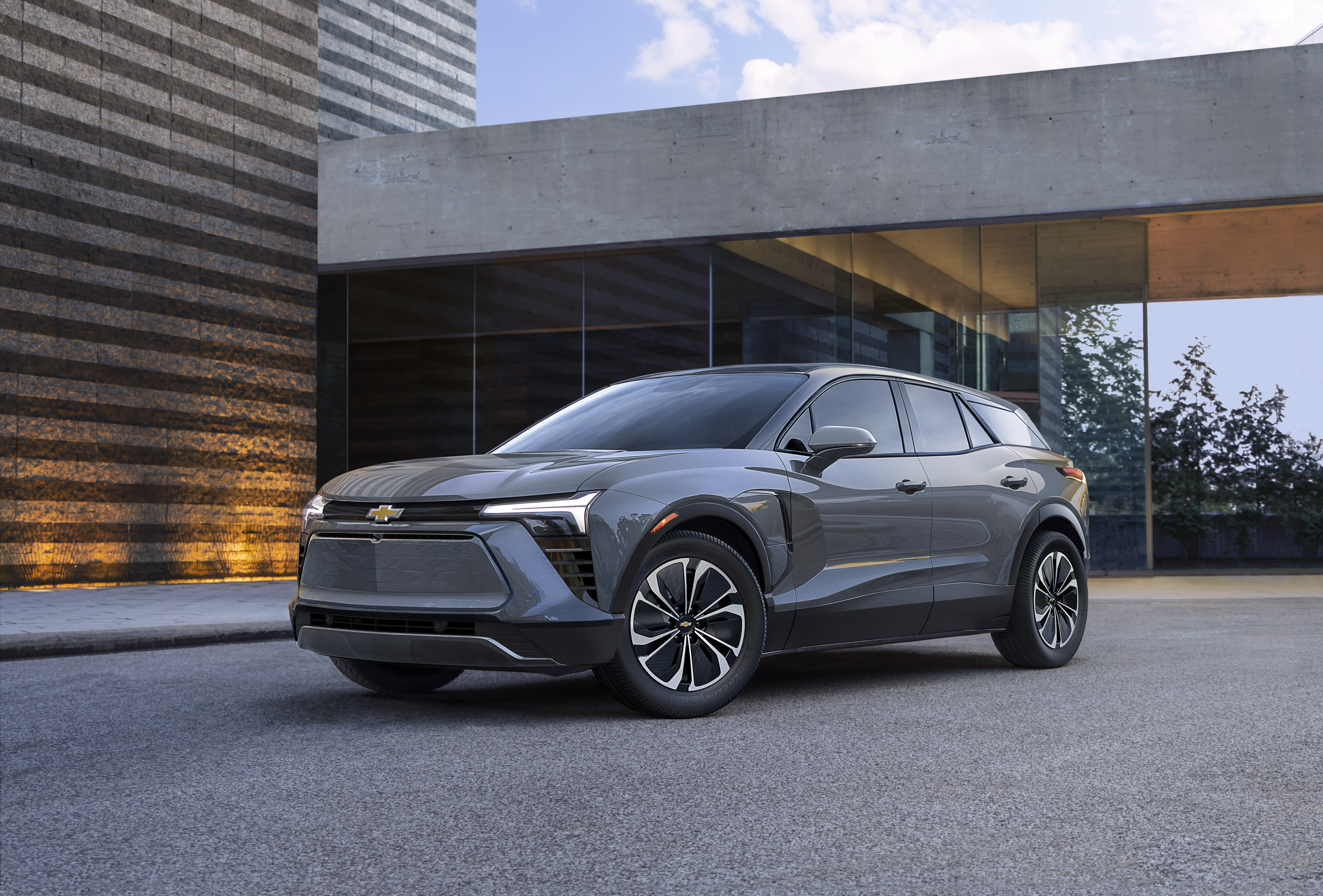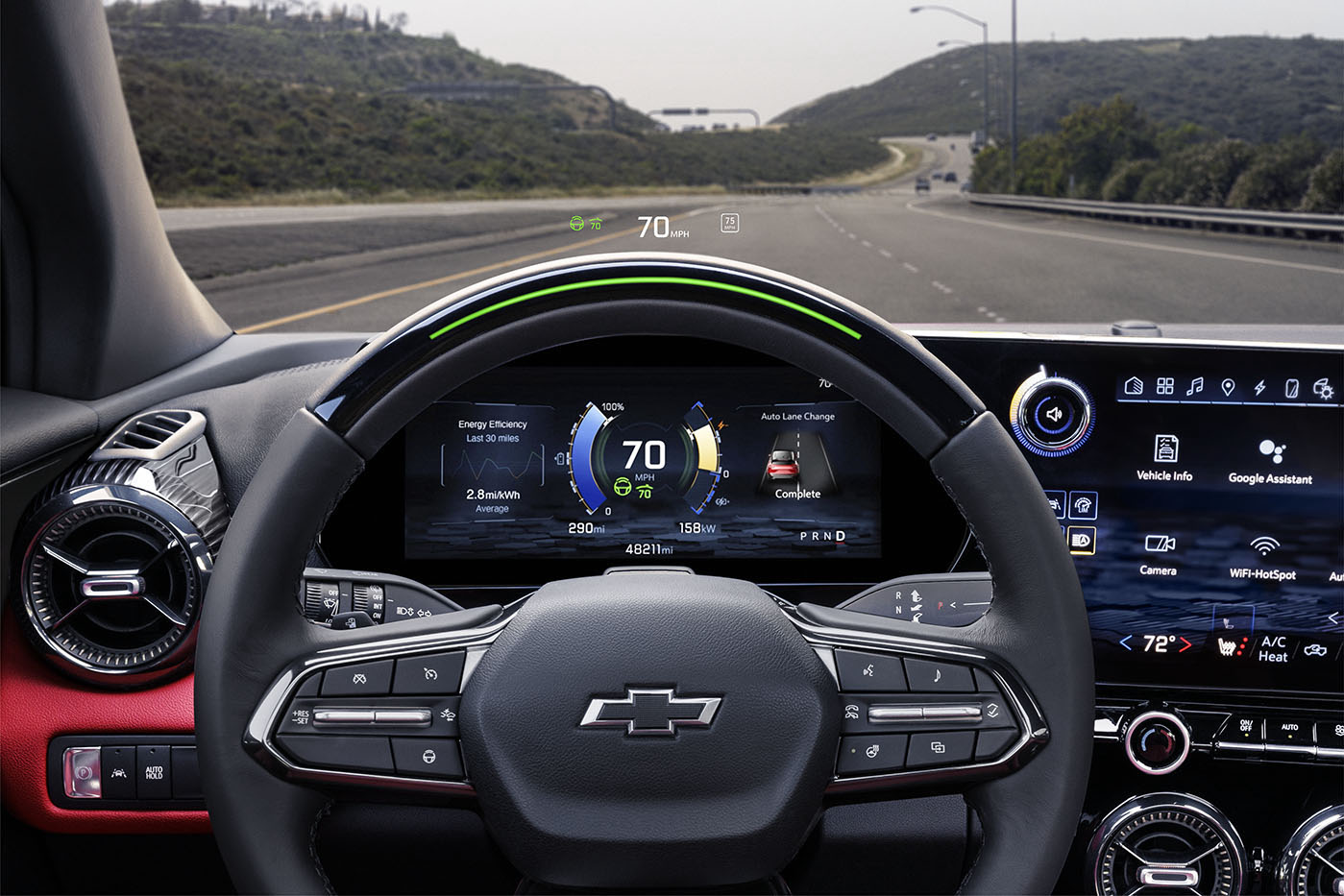GM unveiled Monday evening the Chevrolet Blazer EV, an all-electric SUV with up to 320 miles of range and a starting price of $48,000 that CEO and Chairman Mary Barra hopes will supercharge her bid to surpass Tesla in U.S. EV sales by 2025.
The Chevrolet Blazer EV, which will go on sale in 2023 as a 2024 model year, isn’t the only impending GM electric vehicle. A slew of Cadillac and Chevy EVs are also making their way to market. But the Blazer, at its more affordable price point and in the lucrative SUV segment, could kickstart GM’s sales goals.
Internally, the confidence is high. Blazer is going be a massive statement and illustrate how GM can hit big volume segments, according to Scott Bell, Global VP of Chevrolet.
The Blazer, which was unveiled at a splashy premiere event in Hollywood, California, will sit on GM’s new Ultium architecture, the modular electric platform that offers up to 200 kWh of storage, a 800-volt architecture and is at the heart of the automaker’s EV strategy.
Details of the Blazer EV and its many trims were scant. But enough was shared to give customer’s more than a hint of what to expect by next year.
The Blazer EV will launch with five trims available: 1LT, 2LT, RS, SS, and the Police Pursuit version, which Bell told TechCrunch is a first for the company. The rollout will be staggered, with the LT and RS trims going on sale next summer and the SS and Police Pursuit versions coming in the first quarter of 2024. However, orders opened this evening for interested buyers of any of the trims.
“That’s kind of a first, I think, the first we’ve ever done all three configurations in one product,” Bell said. “We’re gonna be very transparent with consumers and try not to over promise and under deliver. We’d like to try to keep that lined up as best we can. We’re working hard on the manufacturing side of the house to make sure that we can build enough to keep up with demand.”
Bell says he expects demand to be high, too, though he wouldn’t disclose sales targets.
“Blazer’s gonna be a massive statement as to how we can hit segments that are real segments, big volume segments, and you know, Silverado, Blazer, and, and soon to be Equinox, the three largest segments in the industry, and there’s a shot at doing volume. We’re gonna have a great, great piece of that puzzle.” Bell said.
Shaking up the SUV EV market
The Chevy Blazer made its return to the U.S in 2018 and has sold well; though it should be not it’s not its best selling SUV. The Chevy Equinox, which will also get electrified in 2023, gets that accolade.
And recently sales have faltered, in part to supply chain constraints. In the second quarter of 2022, GM reported that it sold 14,296 Blazers, which is down 31% from last year’s comparable data.
Still, analysts believe that the Blazer EV is poised to become second (to Tesla’s Model Y), next year with 6.6% of sales in the compact and mid-sized electric SUV segment.
Bell expects the various Blazer trims will appeal to different customers.
“The early kind of movers and shakers are, are kind of stirring it up a little bit, trying new things. This SS variant will be one of those things, right. There will be performance enthusiasts that will buy this car. Not because it’s a mid-size crossover, but because it goes 0 to 60, in less than four seconds,” Bell said.
(Some) of the Blazer EV specs
Pricing for the 2024 Chevrolet Blazer starts at $47,595 for the 2LT. The RS will start at $51,995, has rear-wheel drive as an option and 320 miles of range. Meanwhile, the high-performance SS (which will arrive later in 2023), will start at around $65,995 and be able to travel an estimated 290 miles on a single charge.
The 1LT, arriving in the first quarter of 2024, will start at $44,995 and have an estimated range of 247 miles.
Super Cruise, GM’s advanced driver assistance system that allows for hands-free driving on certain highways, will be available in certain trims of the Blazer EV.
The 2023 Blazer will come with 11.5 kW charging capability as well as DC Fast charging up to 190 kW, which the company says would add 78 miles of range in 10 minutes. The front lighting on the Blazer EV will show off the state of charge while the SUV charges, increasing in speed and intensity as the charge increases.
Inside the Blazer, customers will get a 17.7-inch color touchscreen as well as an 11-inch color driver information cluster.
There’s no start button on the Blazer; all you have to do is push the brake pedal after closing the door, and the Blazer EV will wake. Chevy also says that through the MyChevy app, owners can plot and locate charging stations along a set route. The Blazer EV will also get GM’s Ulitifi technology, which will allow for over-the-air updates and further customization for apps and services that customers want.
The top-of-the-line, SS or ??Super Sport Blazer EV SS features an exclusive performance AWD configuration that produces up to 557 horsepower and up to 648 lb.-ft. of torque, and offers what Chevy calls, a “unique WOW (Wide Open Watts) mode enabling 0-60 sprints of approximately less than 4 seconds (based on GM-estimates).”
And then there’s the Police Pursuit version, which is made specifically for law enforcement.
According to Bell, Chevy has worked closely with police in different municipalities to create the Police Pursuit version of the Blazer EV. He said it will get the same charging rates and ranges as the consumer model, but that the interior is specifically designed for police needs.
It will be available in rear-wheel drive or dual-motor all-wheel drive and get Brembo brakes. Chevy also said that it will offer commercial trims of the Blazer EV that will meet the needs of pharmaceutical and rental companies, as well.
EV strategy
Chevy has been in the electric game longer than most auto manufacturers, starting with the plug-in hybrid Chevy Volt, which landed in consumers’ hands in 2010. Bell said that the company plans to continue to leverage the learnings from its previous endeavors in the EV space, including the Volt, Bolt EV, and Bolt EUV, to keep expanding the electrified offerings from Chevrolet.
“Our part is to push the consumer into this space,” Bell said, “We’ve got work to do to get the conversation into the masses, and we’re certainly gonna leverage our 3,000 dealers who have consumers where 87% of our population live within 10 miles of them.”
One of the biggest challenges to EV adoption, Bell acknowledges, is public charging infrastructure and EV costs. Bell said that with the launch of Blazer, the company will continue to work to install more fast charging at dealers across the country and work to source local community electricians and installers for home charging. Chevrolet and GM are also going to leverage the dealer network to improve charging access, Bell said.
Last week, GM announced a partnership with Pilot, and Flying J, to collaborate on a nationwide fast-charging network, as well.
The Blazer EV will be built at GM’s Ramos Arizpe plant in Mexico, where the current internal combustion engine version of the Blazer is built.



